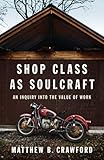
So my few loyal readers will know that given a choice, I'll always opt for working with my hands--I'll make it or fix it or refurbish it rather than buy it. Mostly because I just like doing things with my hands, and I tend to be pretty good at it.
A blog about my work, where international development meets tech, and my life, where food, books, design, dogs, and friends (and the occasional pig) make appearances.




As a good ex-bureaucrat myself I know that rules like this work to get money out of the door faster, and if the money doesn't get out of the door it doesn't have any stimulus effect. But are we reduced to reaching for a process that was developed essentially to prevent public funds from being spent for outre art in figuring out exactly how to spend the stimulus package? I know there aren't easy answers, but this is an unprecedented opportunity/challenge.But that's one grant protocol that poses a challenge for grant writers. They never want to ask for too little — arts groups are constantly cash-strapped. Ask for too much, though, and they might price themselves out of the competition and get nothing at all. It can be a tricky calculus.




 See how everyone is lined up on the left? In London, there are signs everywhere about standing on one side to let others walk up the escalators. In Washington, there are no such signs and the local papers are filled with complaints about how people don't remember to stand to one side. In Japan, no signs, no deviations from the rule. Even by unsuspecting tourists. Amazing. But then, take a look at the transportation map (combined metro and trains). Can you imagine navigating that everyday, let alone actually making it run on time? They apologize when their trains are running 2 minutes late.
See how everyone is lined up on the left? In London, there are signs everywhere about standing on one side to let others walk up the escalators. In Washington, there are no such signs and the local papers are filled with complaints about how people don't remember to stand to one side. In Japan, no signs, no deviations from the rule. Even by unsuspecting tourists. Amazing. But then, take a look at the transportation map (combined metro and trains). Can you imagine navigating that everyday, let alone actually making it run on time? They apologize when their trains are running 2 minutes late.
I am glad that the ladies started with sorghum this year as conditons are very condusive to sorghum harvest ... I am really proud of the way Ms. Fathima has been able to do the work necessary. Please continue this work to enable women to do better and educate them as well in agricultural practices. I for one am willing to help.E.M. Forster was right. Only connect.

As most of my friends and colleagues know, one of my favorite columns of my favorite online publication is The Dismal Science column on Slate. And I muse often--and out loud--about how women do (or do not) behave differently at work than men, or whether they have greater chances at happiness today than before, because I've come to a feminist consciousness late in life and I feel like I need to make up for lost time. And I love the science of economics, despite not having chosen it in college or in graduate school--again, making up for lost time.
So this latest article from Slate started talking about how when legislative mandates forced more women into leadership positions in village councils, the delivery of public goods increased (and the quality of such goods stayed as high as when men were in leadership positions) but residents of villages headed by women were actually less satisfied with the public goods, I thought I'd hit the trifecta.
My trivial little delight at finding an article that was as relevant as any Google ad served up to me in my Gmail account using entirely analog searching techniques aside, this finding really makes me pause. Because the implications are startling. Either we have really not understood the nature of public goods (and they aren't really good for people), or we have hardwired biases against being able to perceive objective reality (which means those biases are extremely difficult to overcome, or ...
It's something I actually often wonder about international development. There's a small group of people in the world (and I hang out with them all the time, so my own perspective is warped) who have the privilege of knowing about, and participating in, the adventure that development can be. How we can communicate the drama and the incredible high that comes from hard-won success to people who don't know about it--and perhaps even have a bias against learning more about it?
But I'm a liberal at heart--I do believe human nature can change. After all, if I can gain feminist consciousness and an appreciation of the dismal science late in life, why not?
 This is my third year serving on the jury of the Anita Borg Social Impact award. And sometimes I've wondered if I was the right person to be on the jury--as a jury we have in the past gone "safe," awarding winners who were in effect being given the award for lifetime achievement, something I have never felt was right for an award named after Anita Borg.
This is my third year serving on the jury of the Anita Borg Social Impact award. And sometimes I've wondered if I was the right person to be on the jury--as a jury we have in the past gone "safe," awarding winners who were in effect being given the award for lifetime achievement, something I have never felt was right for an award named after Anita Borg.